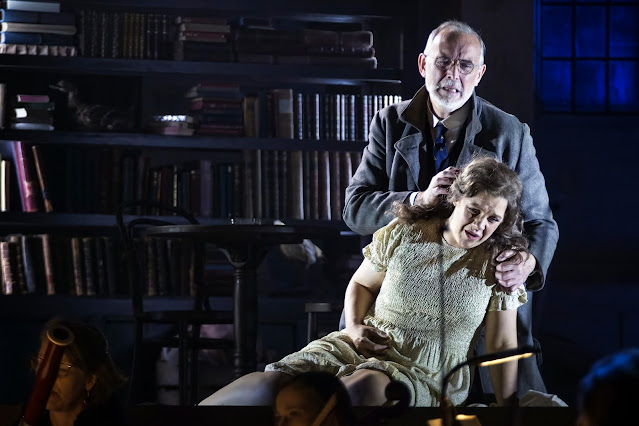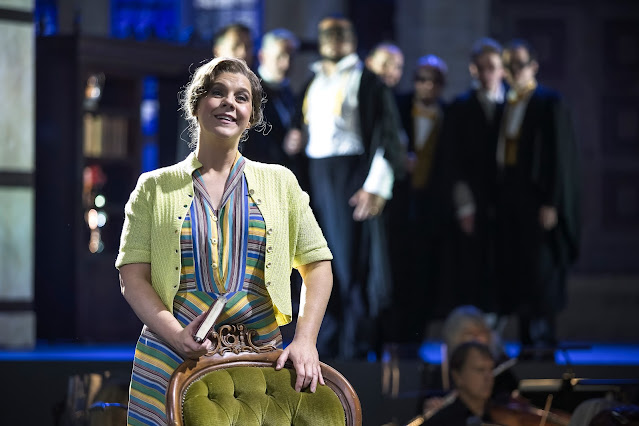 |
| Verdi: Rigoletto - Alison Langer, Stephen Gadd - Opera Holland Park (Photo: Craig Fuller) |
Verdi: Rigoletto; Alison Langer, Stephen Gadd, Elgan Llŷr Thomas, director Cecilia Stinton, City of London Sinfonia, conductor Lee Reynolds; Opera Holland Park
Reviewed 9 June 2023
Rigoletto set in a 1930s Oxbridge College in a production that is imaginative yet not entirely convincing, but illuminated by some fine performances
Does the exact setting for Verdi's Rigoletto matter? Jonathan Miller at ENO, famously set the opera in the context of New York's Little Italy in the 1950s, whilst Zefferelli's handsome, but cumbersome, old production for the Royal Opera was faithful to the libretto's original setting. Of course, Verdi and his librettist, Piave, altered the location as the original source, Victor Hugo's play, was based on King Francis I of France; it is perhaps relevant that a later Royal Opera production set the production at the court of another French monarch, Emperor Napoleon III. In fact, some of the most successful productions that I have seen have given the piece in a non-realistic setting.
Whatever the setting, there are two elements needed to bring out the story - a clear power structure with enough class divisions to bring a real element of danger and a society where a curse really means something. This is why Miller's production worked so well.
 |
| Verdi: Rigoletto - chorus - Opera Holland Park (Photo: Craig Fuller) |
Cecilia Stinton's new production of Verdi's Rigoletto for Opera Holland Park sets the piece in an Oxbridge College during the inter-war period. We caught the performance on 9 June 2023, when Elgan Llŷr Thomas was the Duke with Stephen Gadd as Rigoletto, and Alison Langer as Gilda. Lee Reynolds conducted the City of London Sinfonia. Designs were by Neil Irish, lighting by Jake Wiltshire, and movement by Cailtlin Fretwell Walsh.
During the prelude, we saw Elgan Llŷr Thomas' Duke being stripped to his underwear and his head dunked in a bucket, as part of a hazing ritual for some sort of posh boys club at the college. The opening scene proper was set in the context of a college room and the sections of wooden shelving formed the main feature of the set throughout the opera, which meant that for the opera's final scene, Sparafucile's inn seemed rather a grand one. The fore-stage was very effectively used for the more intimate scenes in Rigoletto's house, though Stinton was not averse to adding extra colour and movement and sometimes to distracting effect.
And the setting, with the Duke now the leading light amongst the entitled Oxbridge yahoos. Well, it worked well as a narrative device, but the element of danger and the importance of the curse simply did not come over. The opera's last scene lacked that element of impulsive danger that is important to the dramaturgy. It might have worked better if Stinton and Irish had used the 1930s college setting as inspiration but then built their own world; as it was, the touches of realism in the production kept bringing us down with a bump.
It did not help that Stinton and Reynolds did not quite make the crucial opening scene work. This is quite intricate, it overlays multiple solo voices, the main orchestra, an off-stage band and the male chorus, into a large-scale ensemble where a great deal of plot is unfolded and various characters are introduced. In the best productions, it is clear who is whom, who is speaking and why. Here, it was tricky working out who was whom, what was happening, and characters like Benson Wilson's Ceprano, and Jacob Phillips' Marullo did not fully register.
 |
| Verdi: Rigoletto - Alison Langer - Opera Holland Park (Photo: Craig Fuller) |
Aurally, it did not help that the off-stage band was replaced by the idea of a gramophone record, to which the partygoers were dancing. The music was jazzed up and the sound was tinny and scratchy, unfortunately, this had the effect of bringing the off-stage band right to the fore of the aural mix, rather than being in the background. It meant that anyone with a solo line over the stage band was in danger of being completely overshadowed.
In this context, it was unfortunate that Stephen Gadd as Rigoletto was still suffering from the after-effects of a cold/hay fever. This was a fine, dramatic account of the title role, and Gadd really incarnated this version of the character; his leg injury and bearing suggested an injured ex-serviceman now in service in the college, his joking having a real edge of bitterness to it. Gadd's account of 'Cortigiani' in Act Two was positively coruscating so it was only more a pity that in other areas we were aware of Gadd managing his voice with care. Nonetheless, his duet with Alison Langer's Gilda in Act One was touchingly moving, the character's stiffness managing to bend a little with his daughter, and then at the end of the opera, Gadd gave Rigoletto a moving dignity.
Alison Langer was a very poised Gilda, certainly not quite the naïve ingenue that is often the case; we first saw her character sneaking back into the house complete with an open bottle of champagne. 'Caro nome' was elegantly done, with Langer achieving something of Gilda's dreamy intensity alongside her poised account of the ornamentation. Langer and Gadd had a strong relationship, their interactions having a profound tug, particularly true in Act Two but occurring throughout the opera.
Elgan Llŷr Thomas was giving his second performance of the title role in this production. He was convincingly youthful and ardent, there was no question that this Duke was a young man, carefree and entitled. Thomas also gave the Duke a sort of naivety, he coasted through the world with a view that he was entitled and never thought about things, rather than him having an essential viciousness. Thomas brought a dramatic intensity to the music, occasionally his voice lacked the seductive sheen that can help here, but this was an engaging performance, making us feel that this Duke was as lost as others in the world.
Matthew Stiff made a terrific Monterone, his appearances having a strength and power that was incredibly vivid and, at times, almost disturbed the production's shaky dramaturgy. Simon Wilding was nicely sinister as Sparafucile, yet someone who was convincingly of the same world as Gadd's Rigoletto, perhaps another ex-soldier struggling. Hannah Pedley was very poised as his sister Maddalena. Benson Wilson was a lively Ceprano with Joanna Harries as his wife, Jacob Philips was Marullo and Mike Bradley was Borsa. All gave enjoyably musical performances, though as I said, Stinton's production did not give them a chance to register properly, which was a shame. Georgia Mae Bishop made a feisty Giovanna, bringing the character more to the fore than usual
 |
| Verdi: Rigoletto - Benson Wilson & chorus - Opera Holland Park (Photo: Craig Fuller) |
The chorus entered into things with a will, joined by seven women actors, and the result was a real sense of a characterful background for the production's particular setting. Lee Reynolds conducted the City of London Sinfonia in an orchestral reduction for 32 players, convincingly incarnating Verdi's score in a stylish manner.
This was an intriguing and engaging production, it made you think about the opera and its setting. Ultimately Stinton's ideas never quite reached the powerful conclusion that the opera needs, but along the way there were some very fine performances indeed.
Never miss out on future posts by following us
The blog is free, but I'd be delighted if you were to show your appreciation by buying me a coffee.
Elsewhere on this blog
- Simplicity is one of the hardest things to do: composer Debbie Wiseman on the challenges of writing music and introducing her new disc, Signature - interview
- Ida revealed: John Wilson & the Orchestra of the Age of Enlightenment take a fresh look at Gilbert & Sullivan's unjustly neglected opera, Princess Ida - opera review
- Terrific and intensely atmospheric: the String Quartet No. 1 and Piano Quintet by Olli Mustonen from the Engegård Quartet and the composer on LAWO Classics - record review
- Because: in a slightly unlikely but completely seductive pairing, countertenor Reginald Mobley is joined by jazz pianist/composer Baptiste Trotignon - record review
- Dennis & Gnasher: Unleashed at the Orchestra: A more than enjoyable event celebrating The Beano with Colin Currie and the BBC Concert Orchestra - concert review
- When all is said and done, his passport simply says that he is a musician: I chat to composer & multi-instrumentalist Richard Harvey about his new disc of choral music - interview
- Reduced forces, but heightened drama: an intimate, chamber production of Wagner's Die Walküre from Regents Opera - opera review
- Style, imagination & not a little daring: a new staging of Handel's Saul at Berlin's Komische Oper - opera review
- No ordinary evening: Christof Loy directs Zandonai's Francesca da Rimini at the Deutsche Oper Berlin with Sara Jakubiak & Jonathan Tetelman - opera review
- The story is 40 years old but nothing much has changed about women's rights in the region: Bushra El-Turk on her opera Woman at Point Zero which comes to Covent Garden next month - interview:
- Regents Opera's new production of Wagner's Die Walküre: a photo essay
- Home



.jpg)







No comments:
Post a Comment